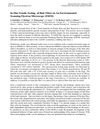 August 2007 in “Microscopy and Microanalysis”
August 2007 in “Microscopy and Microanalysis” Hair fibers break by cuticle cell slipping, shape changing, cuticle fraying, and surface cracking when stretched under specific conditions.
July 2007 in “International Journal of Cosmetic Science” The new polymer improves dyed hair's color, moisture, shine, and smoothness.

Activin A and Follistatin affect how mouse hair follicles grow.
January 2007 in “Annals of The Royal College of Surgeons of England” Removing a hormone-producing adrenal tumor can stop hair loss in women with high testosterone levels.
 July 2005 in “SKINmed/Skinmed”
July 2005 in “SKINmed/Skinmed” BRL 7660, once studied for male contraception, showed promise as an acne treatment but was not developed further due to competing drugs.
August 1998 in “Parasitology International”  September 1997 in “JEADV. Journal of the European Academy of Dermatology and Venereology/Journal of the European Academy of Dermatology and Venereology”
September 1997 in “JEADV. Journal of the European Academy of Dermatology and Venereology/Journal of the European Academy of Dermatology and Venereology” Psychological factors play a significant role in developing alopecia areata.
January 1989 in “Handbook of experimental pharmacology” Drugs can change hair growth and this is important because it can upset people.
April 2023 in “Journal of Investigative Dermatology” New drug targets for hair loss treatment were identified by studying cell interactions in hair follicles.
March 2023 in “Медицинский совет” Minoxidil works better for hair regrowth if you have higher SULT1A1 enzyme activity and ATP concentration.
November 2022 in “Journal of Investigative Dermatology” Combining PRP and minoxidil improves hair growth and density in treating hair loss.
July 2022 in “Journal of Investigative Dermatology” Combining Low Level Light Therapy and minoxidil may help with hair growth, but more research is needed.
June 2022 in “Our Dermatology Online” Trichoscopy is essential for early detection and monitoring of female-pattern hair loss.
March 2022 in “Journal of The European Academy of Dermatology and Venereology” September 2020 in “Eureka: Health Sciences” The emulgel with specific ingredients was effective for treating hair loss.
August 2020 in “DOAJ (DOAJ: Directory of Open Access Journals)” Finasteride, at doses of 5mg or higher, may negatively affect male fertility by reducing the expression of certain genes involved in sperm production.
March 2020 in “Upravlìnnâ, ekonomìka ta zabezpečennâ âkostì v farmacìï” The "Flavosterol" emulgel meets quality standards for treating hair loss.
 March 2020 in “QJM: An International Journal of Medicine”
March 2020 in “QJM: An International Journal of Medicine” SVF and PRP improve hair loss, but SVF causes more side effects.
![Antiexudative Effects of Finasteride and a New Pyrazolo[C]Pyridine Derivative GIZh-72 in Acetic Acid-Induced Experimental Peritonitis](/images/research/10e636c8-32b7-4d90-b645-80e0039c5960/small/4762.jpg) February 2020 in “Bulletin of Experimental Biology and Medicine”
February 2020 in “Bulletin of Experimental Biology and Medicine” Finasteride and GIZh-72 reduce inflammation, with GIZh-72 being more effective.
 April 2018 in “Journal of Investigative Dermatology”
April 2018 in “Journal of Investigative Dermatology” Finasteride helps female-pattern hair loss.
April 2018 in “Rossiiskii Zhurnal Kozhnykh i Venericheskikh Boleznei” All types of alopecia involve hair follicle damage, especially in alopecia areata.
 October 2017 in “Journal of The European Academy of Dermatology and Venereology”
October 2017 in “Journal of The European Academy of Dermatology and Venereology” Stem cells preservation in AGA could be a potential therapy, but more cases needed.
 September 2017 in “Journal of Investigative Dermatology”
September 2017 in “Journal of Investigative Dermatology” Injections of special skin cells showed potential in treating hair loss, with some participants experiencing increased hair density.
October 1995 in “Journal of The European Academy of Dermatology and Venereology” 4350 citations,
May 2012 in “Arthritis & Rheumatism” The new SLICC criteria for diagnosing lupus are more sensitive and accurate than the old criteria.
 408 citations,
January 2017 in “Science”
408 citations,
January 2017 in “Science” Some wound-healing cells can turn into fat cells around new hair growth in mice.
 378 citations,
November 2011 in “Human reproduction update”
378 citations,
November 2011 in “Human reproduction update” Experts recommend using evidence-based methods to diagnose and treat hirsutism, focusing on symptoms and underlying causes.
276 citations,
April 2003 in “Molecular endocrinology” Vitamin D is important for bones, hair, blood pressure, and breast development.






![Antiexudative Effects of Finasteride and a New Pyrazolo[C]Pyridine Derivative GIZh-72 in Acetic Acid-Induced Experimental Peritonitis](/images/research/10e636c8-32b7-4d90-b645-80e0039c5960/small/4762.jpg)




